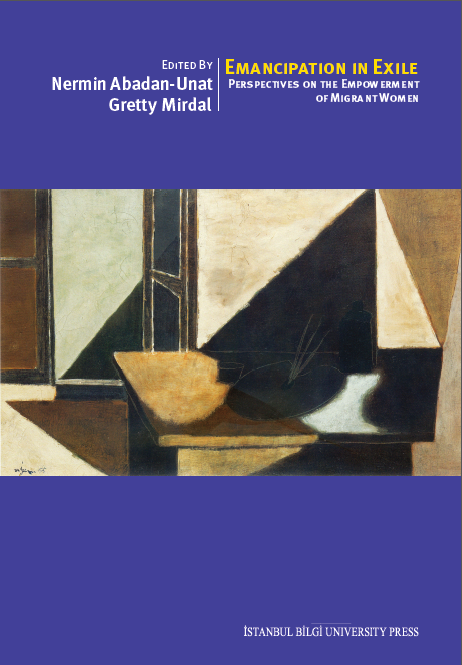
Emancipation in Exile: Perspectives on the Empowerment of Migrant Women
Whereas labour migration had primarily been a male phenomenon throughout history, large numbers of women began to migrate from the South in order to find work in the North of Europe in the 1970’s. In the case of Turkey, women of rural or small town background who had never been employed, who were mentally unprepared, and to some degree unwilling to leave their homes, were suddenly urged by their male relatives to take up industrial or service jobs in foreign countries. By 1974 there were almost three times as many Turkish women working in Germany compared to the number of women in Turkish industry. At that time, Professor Nermin Abadan Unat raised a question on the potential influence that this migration could have on the emancipation –or pseudoemancipation– of these women who were leaving Turkey to become industrial workers abroad. Four decades later, this volume analyses how social, political and religious changes in the home and host countries of the immigrant women, influenced the predicted processes of change. Has there been a significant increase in individual autonomy, self-determination and gender equality? Or has a hasty modernization created a false climate of liberation or “pseudo-emancipation”, without significantly increasing self-determination and independence? How has the very concepts of “emancipation” and “migration” evolved in the meantime? How do the women themselves perceive their own situation?_x000D_
Nineteen experts in social science, and migration and gender studies have contributed to this study of the processes of emancipation and the pathways to the empowerment of women who thought they were leaving temporarily but ended up spending their lives in exile.
The Editors and Authors
Foreword
INTRODUCTION Reflections on an Evolving Debate: Mobility, Modernity and Gender Orders Deniz Kandiyoti
1 Emancipation or Pseudo-emancipation: Fallacy or the Force of Social Control in a Global World Nermin Abadan-Unat
From the Status of Women to Gender Issues
Women’s Migration Begins... On an Individual Scale
Migrant Women and the Change in Family Life
Increasing Social Inequality: Questioning the Rational Economic Women
The Cultural Framework of Women in Muslim Societies with Special Reference to Turkey
Sexual Roles in Islamic Countries: Voluntarily Assumed or Imposed?
Globalization Changing Outlooks
Globalization and the Transition to Transnationalization
Circular Migration: The New Fashion
Female Migrants: Their Problems in a Global World
Conclusion
2 Note on “Pseudo-Emancipation” Dominique Schnapper
3 On the Emancipation of Women in Contemporary Turkey? Yeşim Arat
Women, Emancipation and Liberation in the Turkish Context
The New Challenges
4 Changing Forms of ‘Visibility versus Invisibility’ Concerning Women in Conservative Societies in the Urban Context Sema Erder
The Internalization of Tradition Rules
Reconstructed Forms of Solidarity and Gender Relations
The “New” Urban Patriarchal Order and its Limits
The “New” Social Policy
“Visibility” of Women and Public Space
5 Will Islamism be Women’s Rights Friendly? Compromises and Conflicts on Women’s Rights Agenda in Turkey Serpil Sancar
Differing Origins and Affiliations of Women's Rights Politics in Turkey
Modernist-Nationalist Women’s Rights Perspective in Historical Context
Formation and Maturing of Feminist Women’s Rights Politics
Rise of Kurdish Feminism
Islamist Women’s Organizations and the New Emergence of Muslim Women as Public Figures
Can we Talk about an Emancipatory Islamic Women’s Rights Politics?
Stages of Islamist Women’s Movement in Turkey
Women’s Rights Movement and Agency of Female Islamist Activists
On Women’s Rights Campaigns
Campaign I: Legal Reforms for Women’s Rights (1995-2002) and Engendering Public Policies
Case II: Campaign for Protecting Women Against Violence (2002- ongoing)
Case III: Campaign Against Headscarf Ban
Case IV: “No Veil, No Vote” Campaign
Case V: Campaign Against Abortion Law Amendment
Conclusion: Can we Talk About Islamist Women’s Emancipation by Feminist Agency?
6 Women and Family in Migration: A Social Psychological Perspective Çiğdem Kağıtçıbaşı
The Changing Family Context
International Migration
Factors in the Country of Emigration - Turkey
Factors in the Country of Immigration
Proposed Solutions and Conclusion
7 Fragmented Emancipations - Recomposed Identities Gretty Mirdal - Fatma Küçükyıldız
Turkish Women in Denmark: 1980-2010
The Study
The Beginnings in the Host Country: Stress Factors and Obstacles to Emancipation
The Situation Twenty Years Later
Were Abadan-Unat’s Predictions of Emancipation Fulfilled?
Abadan-Unat’s Criteria of Emancipation
Signs of Emancipation According to Abadan-Unat’s Criteria
The Many Facets of Emancipation
“The Mixed Blessing of Modernity”
12 Migrant Emancipation Revisited - From Mothers to Daughters Anika Liversage - Gretty Mirdal
Introduction
The Case: Three Generations of Immigrant Mothers and Daughters
The Origins: Merve’s Mother Ayşe
The First Generation: Merve
The Second Generation: Hayriye
The Third Generation: Zeynep
Discussion: Signs of Emancipation
Independence and Autonomy
Marriage
Fertility and Childbearing
Education and Wage Work
Changes in Intergenerational Relations
Conclusion
9 Pathways to Emancipation: Immigrant Women from Turkey and their Descendants Czarina Wilpert - Ruth Mandel
Emancipation and Integration
Integration Elsewhere and Intersectionality
An Intersectional Approach to Immigrant Women in Germany
Emancipation or Subordination: Contradictory Trends?
Historical Precedents: Family Migration Patterns According to Women’s Role in the Migration Process
Typology of Migration Patterns
Cultural Diversity, Chain Migration and Women’s Alternatives
Future Aspirations of the Descendants of the Pioneer Guestworkers: Work Values in a Search for a Better Future
The Educational System and Opportunities for Social Mobility
Returning to the Question: Contradictory Trends: Achievement Despite Exclusion?
Gender and Ethnicity: The Social Position of Women from Families Originating from Turkey
Concluding Thoughts
10 Turkish Women in Germany: Old Stereotypes, New Diversity Elisabeth Beck-Gernsheim
Introduction: The Historical Setting
Indifference and Ignorance: The Social Invisibility of Migrants
First Encounters: The Turkish Woman as Exotic Other
Growing Resentment: Turkish Women as Victims of Islam
Recent Trends: New Diversity and Old Stereotypes
Praising Diversity
Statistics of Failure
Claiming their Place, Claiming their Rights
Conclusions
11 Implications of International Migration for Gender Roles: Evidence from Those Left Behind in Morocco and Turkey Ahmet İçduygu - Deniz Karcı Korfalı
Introduction
The Impact of Migration on Those Left Behind
Method of Inquiry and Context
Migration, Remittances and Gender: Findings from the EUMAGINE Data
Concluding Remarks
12 The Relevance of a ‘Culture of Migration’ and Gender Dynamics in Understanding Migration Aspirations in Contemporary Turkey Christiane Timmerman - Kenneth Hemmerechts
Introduction
Gendered Migration Aspirations and Living in a Culture of Migration
Methodology
The Wish to Migrate to another Country
Elements Related to Migration Aspirations
Results
Discussion and Conclusion
13 The Emancipation of Immigrant Women? The View from the United States Nancy Foner
Wage Work: The Benefits
Household Control, Authority, and Independence
Household Division of Labor
Intrinsic Satisfactions of Work
Other Gains
Wage Work: The Burdens and Problems
Working Conditions and Wages
Downward Occupational Mobility
Demands of Child-Care and Household Work
Premigration Cultural Values
Strains with Spouses
Conclusion
14 Women on the Move: Impact of Migration Revisited Mirjana Morokvasic
Gains for Women?
Maintaining or Strengthening the Gender Order
Reliance on Gender Order: Turning it to One’s Own Advantage
Turning to Traditional Family and Marriage as Support
Good Mothers, Self-Sacrificed and Irreplaceable Heroes
Gendered Mobilities as Resource: The Rotation System
Mobile Entrepreneurs
Arrangements
Index
